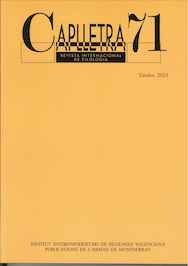The corpus/status dialectics in the history of the Catalan language. Towards a comprehensive explanation of linguistic changes
DOI:
https://doi.org/10.7203/caplletra.71.21039Keywords:
history of the Catalan language, language change, linguistic variation, language planning, language codification, standardization, Northwestern Catalan Abstract
Abstract
In this paper, we advocate overcoming the dichotomies that fragment the study of language facts (synchrony vs. diachrony, linguistics vs. sociolinguistics, internal history vs. external history), in favor of an approach that integrates the maximum number of possible explanatory factors. A suitable field for this confluence is the analysis of ongoing language changes, which are those that take place in real time in front of the eyes of the researcher, who can thus benefit from the proximity to the object of study and from the accessibility to the multiple factors that condition its evolution, provided that he is capable of not getting overly involved. The analysis of the transformations observed in Northwestern Catalan since the resumption of the standardization process in Catalonia shows how we can increase the degree of understanding of linguistic changes if we are attentive to the interactions that occur between the socially established uses, the forms subjected to the constraints of the system, and the perceptions that end up forming the linguistic awareness of speakers understood as individuals and as a social body.
 Downloads
Downloads
Downloads
Published
How to Cite
-
Abstract436
-
PDF (Català)337
Issue
Section
License
Authors submitting work to Caplletra for publication must be the legitimate holder of the usage rights. Legitimacy for the purposes of publishing the work must also include images, tables, diagrams and any other materials that may complement the text, whether they are the author of such material or not.
Copyright: on publishing their work in the journal, the author grants Caplletra. Revista Internacional de Filologia usage rights (reproduction, distribution and public communication) for both the paper printed version and for the electronic version.
All work published in Caplletra is covered by the Creative Commons license type Attribution-NonCommercial-NoDerivatives 4.0 (CC BY-NC-ND 4.0).
RESPONSABILITY
Caplletra. Revista Internacional de Filologia does not necessarily identify with the points of view expressed in the papers it publishes.
Caplletra. Revista Internacional de Filologia accepts no responsibility whatsoever for any eventual infringement of intellectual property rights on the part of authors.






